Nations emphasize health through ceremony, nation-rebuilding and self-determination
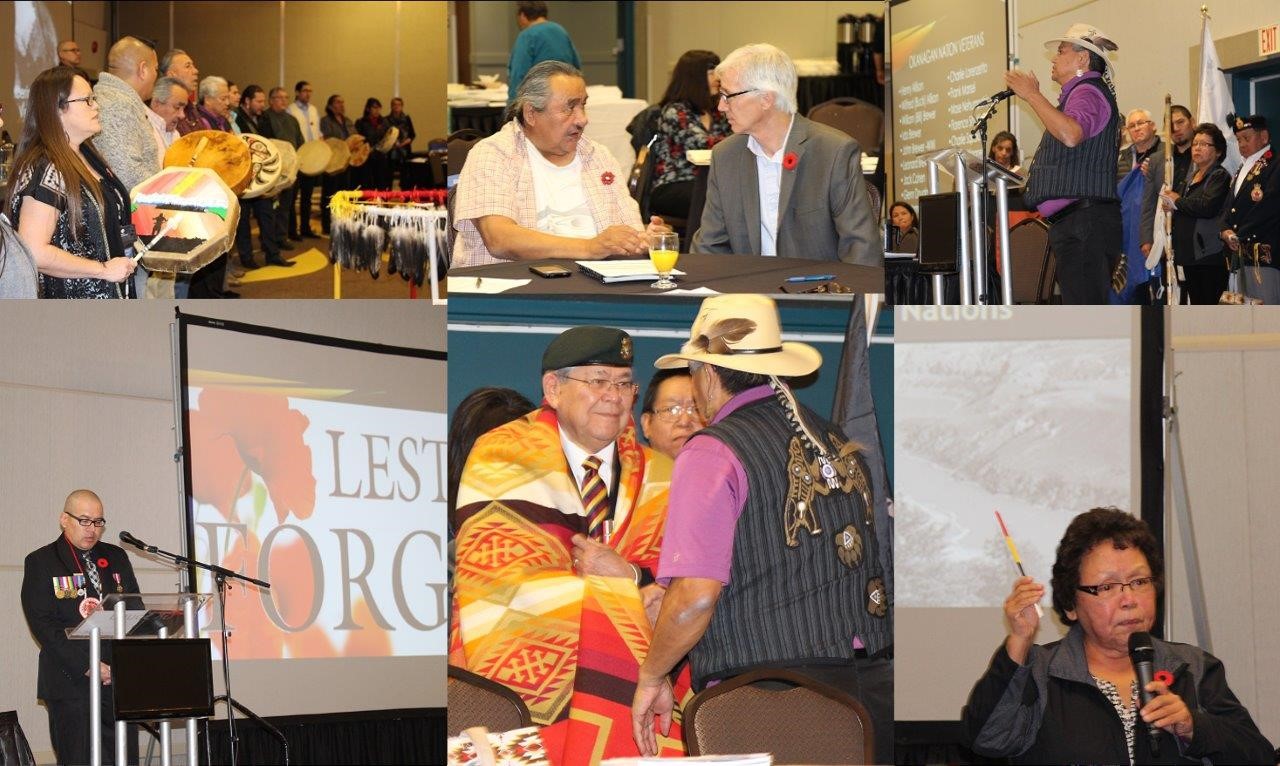
Political and Health Leadership from the Dãkelh Dené, Ktunaxa, Nlaka'pamux, Secwepemc, St'át'imc, Syilx and Tsilhqot'in — gathered for the 2017 Interior Regional caucus November 7-9 in Tk'emlups, Secwépemc Territory. The dialogue over the three-days was chaired by Ko'waintco Michel (Nlaka-pamux) and Chief Charlene Belleau.
Hosted by the First Nations Health Council, First Nations Health Authority, and First Nations Health Directors Association, the Interior regional caucus had over 199 participants. Fourteen chiefs and eight proxies were in attendance, alongside delegates representing 40 of 54 Interior communities.
The caucus opened with a Pipe Ceremony hosted by the Secwepemc Nation and an acknowledgment of the region's recent crises that included flooding wildfires and the loss of loved ones. Gifting followed the ceremony.
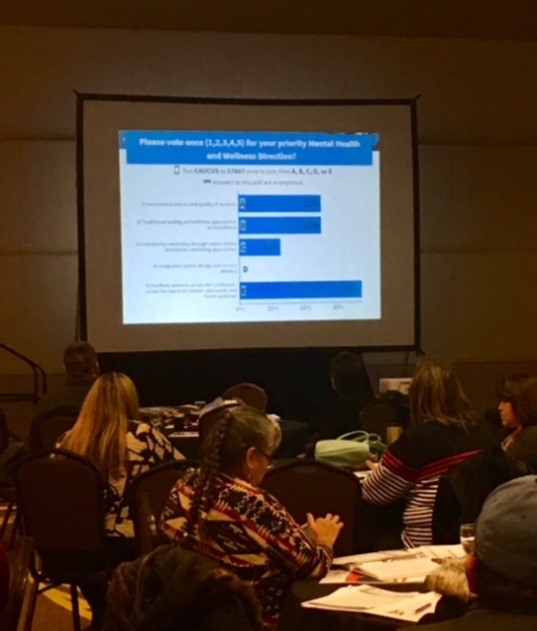
Over the three days, FNHA, FNHC and FNHDA heard directly from delegates on key issues related to health matters in the region. Polling revealed:
• 96 percent of respondents agreed with the Harm Reduction Policy Statement vision.
• 83 percent of respondents agreed with the Mental Health and Wellness and Substance Use Statement vision.
• 28 percent of respondents felt that their communities have access to adequate resources for emergency planning.
• 28 percent of respondents felt that their communities were aware of available resources for emergency planning.
• 51 percent of respondents said that "increased access to and quality of services" was the top Mental Health and Wellness priority.
Interior region provides updates to the seven Nations
Lisa Montgomery-Reid, Regional Director, FNHA opened information sharing on day one by announcing a $2 million shared investment by Interior Health (IH) with a $1 million investment by FNHA, to bring Elder care closer to home and enhance nursing services to support First Nations Elders and those living with chronic conditions. "This investment compliments and adds value to the existing Nation Based health care delivery models, "shares Lisa Montgomery-Reid.
Gwen Phillips (Ktunaxa Nation), FNHC Representative then provided the FNHC, Interior Region Nation Executive (IRNE) update. An update on the Partnership Accord Leadership Table was then provided by PALT members Gwen Phillips and Diane Jules, IH Board Member. Gwen and Diane welcomed new PALT members Kukpi7 Charlene Belleau, Secwepemc Nation and Dr. Doug Cochran, IH Board Chair. Recent partnership highlights also included the signing of a Cultural Safety Declaration between Williams Lake area Chiefs and IH Leadership as well as a protocol signed between FNHA CEO, Joe Gallagher and IH CEO, Chris Mazurkewich.
Kukpi7 Charlene Belleau shared her approach to wildfires and flooding, "Support during emergencies needs to be comprehensive, holistic and incorporate a First Nations perspective. Our focus is now on lessons learned, recovery, healing and rebuilding"
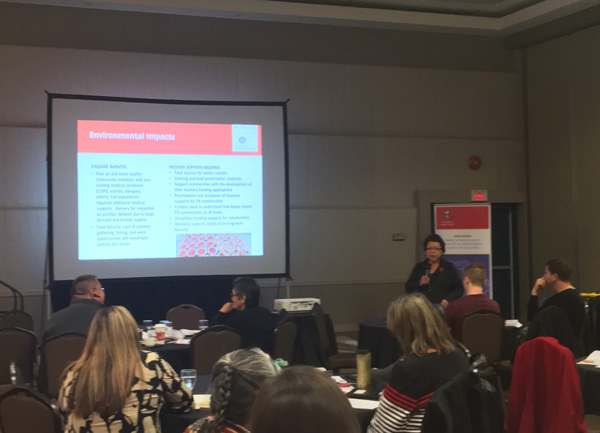
Kukpi7 Charlene Belleau, (Secwepemc) delivered an emotional yet hopeful presentation about the impacts of wildfires and flooding on First Nations. She stated that recovery supports must be culturally relevant and safe.
Kukpi7 Charlene Belleau, (Secwepemc) delivered an emotional yet hopeful presentation about the impacts of wildfires and flooding on First Nations. She stated that recovery supports must be culturally relevant and safe.
Belleau emphasized the interrelatedness of mental wellness, traditional/spiritual wellness, and food security in times of disaster and crisis. She described the economic and environmental concerns, including the loss of medicines/plants which are often beyond the scope of government's recovery efforts.
Allan Louis ,Syilx), FNHC Representative, described his First Nation's response to flooding. He commented on lessons learned from the past year and emphasized the need for planning a response for the coming spring.
Following the emergency response panel, Interior leadership sang an honour song for the FNHA employees marking the personal sacrifices and long hours of those who worked tirelessly during the wildfire emergency this summer.
Social determinants of health – rebuilding Nations is at the heart of the dialogue
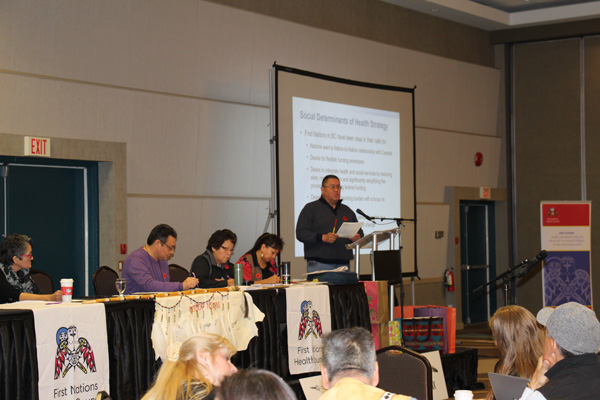
Grand Chief Doug Kelly (Sto:lo), Chair of the FNHC, presented a discussion paper titled "The Ten-Year Determinants of Health Strategy". This document represents a summary of discussions to date with First Nations in BC on the social determinants of health.
Leadership heard from FNHC Interior Representatives, Kukpi7 Charlene Belleau, Allan Louis and Gwen Phillips on the engagement to date with interior leadership on the social determinants of health. Leaders emphasized the need for Nation-to-Nation relationships with Canada as well as the need for flexible funding, strengthened relationships with service partners and recognition and respect for the uniqueness of each individual community.
As a way to achieve the vision, Grand Chief Kelly outlined a path forward. He shared, "You need to take the discussion paper to your nations and lets work together to come to a consensus on approach. The stronger we are at consensus on the approach, the quicker we can access funding and work on planning and doing the work."
Many leaders expressed the importance of language, laws, governance and resources. Interior leadership noted that planning should focus on Nation building and the work moving forward should be through Nation-to-Nation relationships.
An engagement session with INAC and the new Ministry of Children and Family Development (MCFD) focused on the need for ongoing support for children in care, children aging out of care, and for families across the region. Many leaders conveyed the importance of prevention, and the need for new resources and capacity at the community level.
The key message that the group brought forward to our government partners was the need to respect First Nations jurisdiction, existing protocols and previous commitments.
Coming Home Ceremony recognizes veterans on National Aboriginal Veterans Day
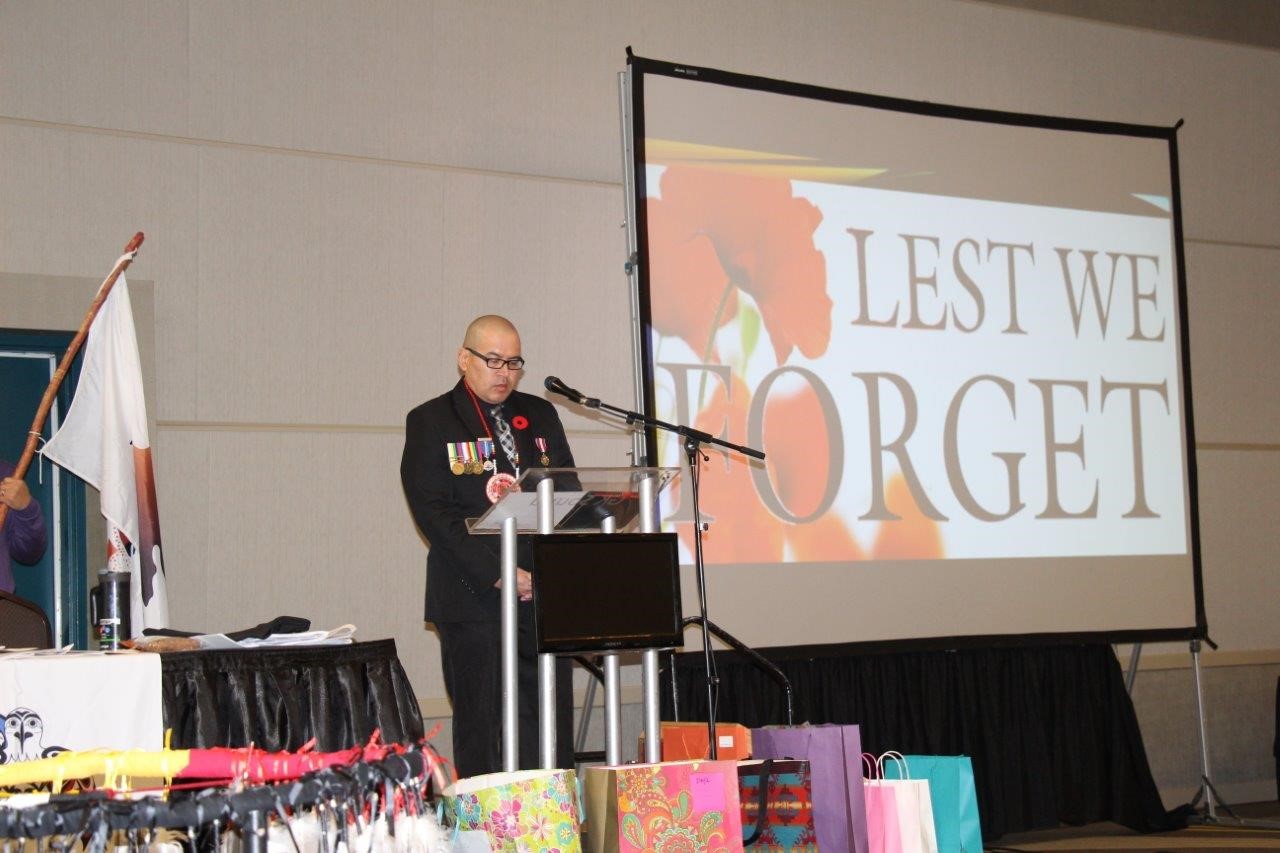
On Wednesday, November 8, in honor or National Aboriginal Veterans Day, Veterans from the region were honored through ceremony with blanketing and a song. Delegates acknowledged attending veterans through handshakes, hugs and expressions of gratitude.
During an emotional coming home ceremony one young veteran shared his appreciation. With tears in his eyes, he said, "This is the first time I have been recognized like this."
The ceremony closed with a moment of silence and the singing of Soldier Boy.
Interior Nations encourage government partners to come and visit
During a mental health and addictions presentation, Interior leadership described the impacts of colonization, and the struggles within their communities. The group clearly expressed that government partners need to visit communities directly to understand their needs and concerns.
As a result of a discussion about successful Nation-based approaches in the region, leadership agreed that resources should come directly to communities and Nations for the best outcomes. Of particular note, the Syilx communities worked together to support culturally sensitive health and wellness outcomes for their people through a community-driven Nation-based approach.
Kukpi7 Charlene Belleau, Secwepemc Nation and Sgt. Dee Stewart spoke on Missing and Murdered Women and Girls and the plenary shared a prayer for those who are missing.
One leader ended the day by sharing, "Our Interior leadership is truly shifting the way health is being addressed and you can see this by the way our government partners are coming to these sessions. We've come a long way in the past few years."
Leadership calls for more staff, resources and in-community training to support children and youth
The final day of the Interior Region Caucus focused on Children and Youth Mental Health, Early Years Services, an update on Meditech and an update from the First Nations Health Directors Association (FNHDA) from Interior FNHDA representatives.
Martin Bartel and Robert Lampard, representatives from the Ministry of Children and Family Development provided an overview of the Ministry's approach to developing a new framework for children and youth mental health. In response, Chiefs and leaders stressed the need for culturally safe services based on the culture of each individual Nation. They noted that response times are too long, and that a streamlined crisis response process is needed.
Early years services need improvement – Leadership looks forward to a new dialogue
Shauna Krauss, representative from Service Canada provided a brief report back on the engagement process of developing the National Indigenous Early Learning and Childcare Framework, which leadership engaged on during the last Interior Caucus session.
In addition, Emily Horton and Corrine Sagmiester, representatives from the Ministry of Children and Family Development presented on a coordinated approach to funding early years services for First Nations on reserve. They noted that application-based government funding models can lead to gaps in services and programming and form barriers due to the significant burden placed on community resourcing.
In response to the Children and Family Development presentation, Chiefs and leaders stated that daycare funding is critical, that government needs to meet directly with the Nations, and that navigating various partners and programs is confusing.
Chief Harvey McLeod from the Upper Nicola Band, shared, "We want our children to know… that they are going to be safe, that we are going to allow them to dream and … fulfill the purpose that the Creator gave them. … I'm looking forward to a new dialogue and to breaking through the silos."
Attendees also suggested expanding Head Start to include daycare, wage parity for early childhood staff in community, and funding for infrastructure. Finally, funding for pre- and post-natal care, as well as after school care, was noted as critical.
The afternoon of day three focused on updates for Health Directors included the expansion of IH's Meditech system. The project has been piloted with Splatsin First Nation and is currently being rolled out to nearly 16 communities with more communities being added quarterly. This was followed by a presentation and dialogue with the FNHDA's Interior representatives: Shelley Lampreau, Jackie McPherson and Franny Alec.
Closing comments and a prayer were provided by Allan Louis, Syilx Nation.

